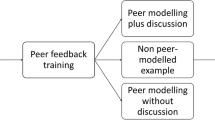Abstract
Background
Given that training is integral to providing constructive peer feedback, we examined the impact of a regularly reinforced, structured peer assessment method on student-reported feedback abilities throughout a two-year preclinical Communication Skills course.
Methods
Three consecutive 32-student medical school classes were introduced to the Observation-Reaction-Feedback method for providing verbal assessment during Year 1 Communication Skills orientation. In biweekly small-group sessions, students received worksheets reiterating the method and practiced giving verbal feedback to peers. Periodic questionnaires evaluated student perceptions of feedback delivery and the Observation-Reaction-Feedback method.
Results
Biweekly reinforcement of the Observation-Reaction-Feedback method encouraged its uptake, which correlated with reports of more constructive, specific feedback. Compared to non-users, students who used the method noted greater improvement in comfort with assessing peers in Year 1 and continued growth of feedback abilities in Year 2. Comfort with providing modifying feedback and verbal feedback increased over the two-year course, while comfort with providing reinforcing feedback and written feedback remained similarly high. Concurrently, student preference for feedback anonymity decreased.
Conclusions
Regular reinforcement of a peer assessment framework can increase student usage of the method, which promotes the expansion of self-reported peer feedback skills over time. These findings support investigation of analogous strategies in other medical education settings.

Similar content being viewed by others
Availability of data and material
Due to the IRB-exempt nature of this research, participants of this study did not agree for their data to be shared publicly, so supporting data are not available.
References
Dannefer EF, Prayson RA. Supporting students in self-regulation: Use of formative feedback and portfolios in a problem-based learning setting. Med Teach. 2013;35(8):655–60. https://doi.org/10.3109/0142159x.2013.785630.
Lerchenfeldt S, Mi M, Eng M. The utilization of peer feedback during collaborative learning in undergraduate medical education: a systematic review. BMC Med Educ. 2019;19(1):321. https://doi.org/10.1186/s12909-019-1755-z.
Burt J, Abel G, Elliott MN, Elmore N, Newbould J, Davey A, et al. The Evaluation of Physicians’ Communication Skills From Multiple Perspectives. Ann Fam Med. 2018;16(4):330–7. https://doi.org/10.1370/afm.2241.
Hulsman RL, Peters JF, Fabriek M. Peer-assessment of medical communication skills: the impact of students’ personality, academic and social reputation on behavioural assessment. Patient Educ Couns. 2013;92(3):346–54. https://doi.org/10.1016/j.pec.2013.07.004.
Cushing A, Abbott S, Lothian D, Hall A, Westwood OMR. Peer feedback as an aid to learning – What do we want? Feedback. When do we want it? Now! Med Teach. 2011;33(2):e105-e12. doi:https://doi.org/10.3109/0142159x.2011.542522.
Burgess AW, Roberts C, Black KI, Mellis C. Senior medical student perceived ability and experience in giving peer feedback in formative long case examinations. BMC Med Educ. 2013;13(1):79. https://doi.org/10.1186/1472-6920-13-79.
Ludwig AB, Raff AC, Lin J, Schoenbaum E. Group observed structured encounter (GOSCE) for third-year medical students improves self-assessment of clinical communication. Med Teach. 2017;39(9):931–5. https://doi.org/10.1080/0142159x.2017.1332361.
Li H, Xiong Y, Hunter CV, Guo X, Tywoniw R. Does peer assessment promote student learning? A meta-analysis Assess Eval High Educ. 2020;45(2):193–211. https://doi.org/10.1080/02602938.2019.1620679.
Perera J, Mohamadou G, Kaur S. The use of objective structured self-assessment and peer-feedback (OSSP) for learning communication skills: evaluation using a controlled trial. Adv Health Sci Educ. 2010;15(2):185–93. https://doi.org/10.1007/s10459-009-9191-1.
Cantillon P, Sargeant J. Giving feedback in clinical settings. BMJ. 2008;337:a1961. https://doi.org/10.1136/bmj.a1961.
Finn GM, Garner J. Twelve tips for implementing a successful peer assessment. Med Teach. 2011;33(6):443–6. https://doi.org/10.3109/0142159X.2010.546909.
Pendleton D. The Consultation: An Approach to Learning and Teaching. vol 6. Oxford University Press; 1984.
Vickery AW, Lake FR. Teaching on the run tips 10: giving feedback. Med J Aust. 2005;183(5):267–8. https://doi.org/10.5694/j.1326-5377.2005.tb07035.x.
Dannefer EF, Henson LC. The portfolio approach to competency-based assessment at the Cleveland Clinic Lerner College of Medicine. Acad Med. 2007;82(5).
Hsieh H-F, Shannon SE. Three approaches to qualitative content analysis. Qual Health Res. 2005;15(9):1277–88.
Rudy DW, Fejfar MC, Griffith CH, Wilson JF. Self- and peer assessment in a first-year communication and interviewing course. Eval Health Prof. 2001;24(4):436–45. https://doi.org/10.1177/016327870102400405.
Chou CL, Masters DE, Chang A, Kruidering M, Hauer KE. Effects of longitudinal small-group learning on delivery and receipt of communication skills feedback. Med Educ. 2013;47(11):1073–9. https://doi.org/10.1111/medu.12246.
Arnold L, Shue CK, Kritt B, Ginsburg S, Stern DT. Medical students’ views on peer assessment of professionalism. J Gen Intern Med. 2005;20(9):819–24. https://doi.org/10.1111/j.1525-1497.2005.0162.x.
Papinczak T, Young L, Groves M. Peer assessment in problem-based learning: a qualitative study. Adv Health Sci Educ Theory Pract. 2007;12(2):169–86. https://doi.org/10.1007/s10459-005-5046-6.
Acknowledgments
The authors thank Dr. Beth Bierer for her thoughtful comments on a previous draft of this manuscript. They also thank Josephine Volovetz, Catherine Ituarte, Kelly Shibuya, Blair Mitchell-Handley, and Brian Schroer for assistance in developing and implementing ORF.
Funding
The authors received no financial support for the research, authorship, and/or publication of this article.
Author information
Authors and Affiliations
Contributions
All authors contributed to study conception and design. Material preparation and data collection were performed by Alice Tzeng, Bethany Bruno, Jessica Cooperrider, Perry B. Dinardo, Rachael Baird, Carol Swetlik, Brittany N. Goldstein, and Radhika Rastogi. Data analyses and initial manuscript drafting were performed by Alice Tzeng, Bethany Bruno, Jessica Cooperrider, and Perry B. Dinardo. All authors commented on previous versions of the manuscript, and read and approved the final manuscript.
Corresponding author
Ethics declarations
Ethics approval
The project was categorized as quality improvement by the Cleveland Clinic Institutional Review Board and thus was granted an exemption. All work was conducted in accordance with the 1964 Helsinki Declaration.
Conflicts of interest
On behalf of all authors, the corresponding author states that there is no conflict of interest.
Consent to participate
Informed consent was obtained from all individual participants included in the study.
Additional information
Publisher’s Note
Springer Nature remains neutral with regard to jurisdictional claims in published maps and institutional affiliations.
Supplementary Information
Below is the link to the electronic supplementary material.
Rights and permissions
About this article
Cite this article
Tzeng, A., Bruno, B., Cooperrider, J. et al. A Structured Peer Assessment Method with Regular Reinforcement Promotes Longitudinal Self-Perceived Development of Medical Students’ Feedback Skills. Med.Sci.Educ. 31, 655–663 (2021). https://doi.org/10.1007/s40670-021-01242-w
Accepted:
Published:
Issue Date:
DOI: https://doi.org/10.1007/s40670-021-01242-w




